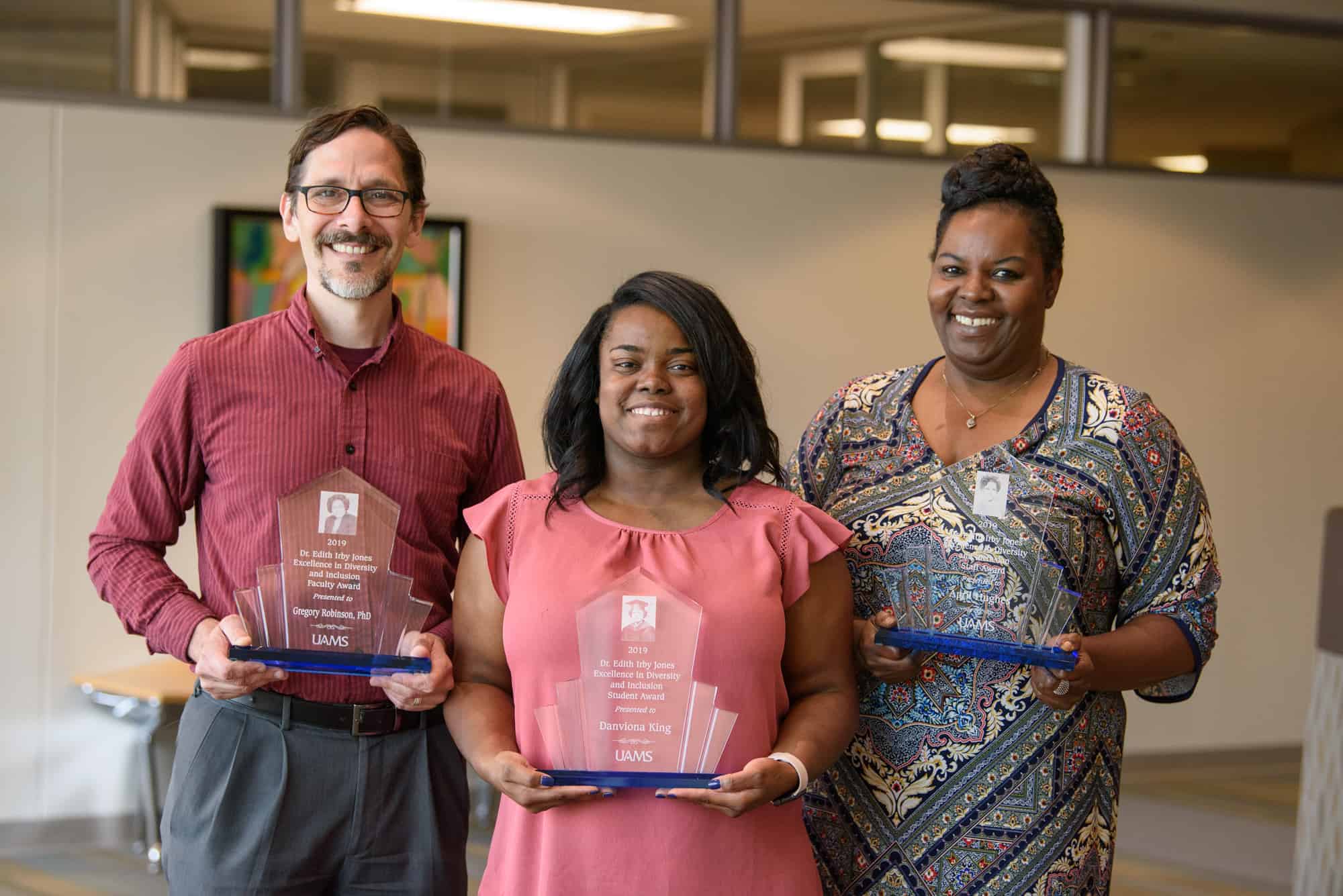CHP Associate Professor ‘Honored’ by Diversity Award
| Greg Robinson, Ph.D., CCC-SLP, felt honored when his colleagues nominated him for the Dr. Edith Irby Jones Excellence in Diversity and Inclusion Award for faculty.
An associate professor in the Department of Audiology and Speech Pathology, Robinson started a transgender language clinic in 2015 and co-authored the first peer-reviewed research in the American Speech-Language-Hearing Association journal to involve the LGBTQ population.
He also has worked to increase representation from underrepresented groups in the Communication Sciences and Disorder’s master’s program and to engage students in interprofessional outreach clinics to impoverished, high minority medical deserts.
Despite these efforts, he was shocked when he heard his name called as the winner.
“I wasn’t seeking recognition for my work, and I personally thought so many of the other nominees were more deserving than I,” he said. “But after my name was called, so many people came up to thank me for my research in the transgender community.”
Robinson started the Transgender Language Clinic in 2015 — a role he found by happenstance. Prior to then, a colleague of Robinson’s with expertise in voice production and voice disorders had treated members of the trans community in Little Rock. After that colleague left Little Rock, members of the community asked Robinson to continue the work.
“Voice isn’t my specialty, so I was apprehensive at first,” he said. “However, there was a need, and I felt compelled to help.”
Helping required a lot of research, Robinson said. He took the first client and paired her with a student.
“I told the student ‘I don’t know exactly what we’re doing here, and I don’t know how to do this. I’ve never done this before; you’ve never done this before, but listen we’re going to read a lot, we’re going to research a lot, and we’re going to get through this together. And we’re just going to be clear with the client that this is something we’re doing together and learning.’”
The client made rapid progress, Robinson said. “I was blown away by how life-changing it was for her to be able to communicate in a way that matched her true gender.”
Most of Robinson’s clients are trans women. When a person takes estrogen, it doesn’t affect the vocal cords. The same isn’t true for trans men who take testosterone, Robinson said.
In addition to changing the pitch of the voice, the therapy involves looking at the differences in the ways men and women communicate and then integrating the desired gendered behaviors. The sessions include individual therapy, group therapy and a support group.
Since that first client, the clinic has grown. Last semester, Robinson and his students treated nine clients. Some clients last more than one semester, he said. Even after they graduate, clients always have the option of coming to the support group free of charge and serving as a mentor for someone going through the process.
“One of the most amazing things is how many of our trans clients want to help train the future of our profession,” he said. “They want to ensure that the students are getting the training they need so that other trans people they come into contact with over the course of their careers are treated with affirmation and respect.”
Overseeing the clinic has been an amazing experience, he said.
“Sometimes I wonder how I get to be so lucky that I get to witness when a client finally hears her voice for the first time and it actually sounds like who she has always felt like she was in her head. It all matches,” he said.
In addition to his work with the LGBTQ community, Robinson is passionate about increasing diversity in the field of speech pathology, which is about 95 percent white females.
“In speech language pathology, it’s so important to have representation from underrepresented groups because we’re dealing with communication and language, which is the glue that holds a culture together,” Robinson said.
This diversity is important to helping the profession gain a better understanding of when a client is speaking in a dialect, such as African American English or Southern White Vernacular English, versus when a client has a speech-language disorder, he said.
“If we don’t have those diverse speaking voices moving forward our research, moving forward our therapy, moving forward our profession and helping us understand, then we are going to remain where we basically value the speech of middle- to upper-class Ohioan people as the only correct way of speaking,” he said. “We can — and must — do better.”
